Monday, 27 de May
MAY 26, 2013 9:42 PM 0 COMMENTS
In Guerrero state, southern Mexico, locals of Zihuatanejo and Petatlán have fought a sometimes violent battle in a two-year long conflict that the federal government have yet to resolve.
Zihuatanejo, the14th of May. Rising before the sun’s first rays, these workers have no uniforms, nor ID cards, they set to work cleaning their boats and leave at first light to catch fish, luck permitting.
They are fishermen, and the waves and pelicans are their guides.
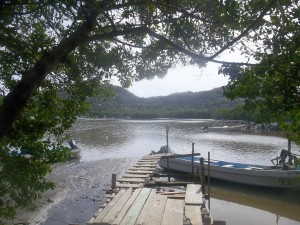 Helio Orbe can’t remember exactly when he started going out to sea, but describes it as “fun, and dangerous too; you never know if you’ll come back”. He has been a fisherman in the port of Zihuatanejo for 20 years.
Helio Orbe can’t remember exactly when he started going out to sea, but describes it as “fun, and dangerous too; you never know if you’ll come back”. He has been a fisherman in the port of Zihuatanejo for 20 years.
Zihuatanejo de José Azueta is a small port located in Guerrero state, southern Mexico with a population of over 118,000 inhabitants. Its economy revolves around traditional fishing and tourism. But in the last decade, owing to national policies, their life source has been cut off.
In the midst of the bad economy, the people of Zihuatanejo are facing up to fight for their land: the port, surrounding rivers, harbour, Las Salinas lagoon and Barra de Potosi lagoon (Petatlán municipality) are under threat of indiscriminate fishing and privatisation of beaches at the hands of Mexican politicians and tycoons.
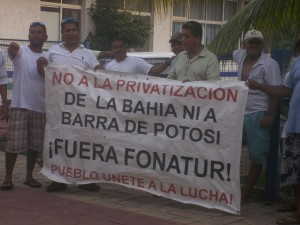 On the 10th of October 2010, the Ministry of Communications and Transport (Secretaría de Comunicaciones y Transportes/SCT) granted a concession to Fonatur Port Authority (Fonatur Operadora Portuaria SA de CV) giving them full ownership and administrative rights to the port area for the next 25 years. It includes rights to the Barra de Potosi lagoon, encompassing over 400 hectares of mangrove swamp and considered an area of ecological importance due to the abundance of aquatic birds, land and marine fauna – many of which are native to the area.
On the 10th of October 2010, the Ministry of Communications and Transport (Secretaría de Comunicaciones y Transportes/SCT) granted a concession to Fonatur Port Authority (Fonatur Operadora Portuaria SA de CV) giving them full ownership and administrative rights to the port area for the next 25 years. It includes rights to the Barra de Potosi lagoon, encompassing over 400 hectares of mangrove swamp and considered an area of ecological importance due to the abundance of aquatic birds, land and marine fauna – many of which are native to the area.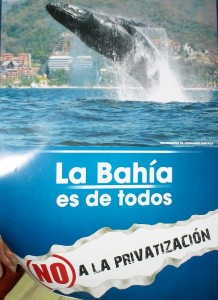 It was not, however, until the decree was published in the Official Journal of the Federation (Diario Oficial de la Federación/DOF) under the government of then President Felipe Calderón Hinojosa (PAN party), that those affected were informed of the plan.
It was not, however, until the decree was published in the Official Journal of the Federation (Diario Oficial de la Federación/DOF) under the government of then President Felipe Calderón Hinojosa (PAN party), that those affected were informed of the plan.
On top of that, ex-mayor Alejandro Bravo Abarca (PRI party) handed over the port administration so shipping income now goes into private hands as opposed to the SCT.
By the 13th of February, battle had commenced, fishermen, locals, traders, boatmen and natives began to organise themselves to rise against the privatisation of what was once a free port.
That day in February saw the first gathering of over 500 local protesters. The battle lines had been drawn.
The concession given to Fonatur includes 17 hectares of the Las Salinas lagoon, the administration of the port area, surrounding rivers, use of the maritime dock, two quays and 168 hectares of mangrove swamp in Barra de Potosí in Petatlán (considered a priority mangrove area due to its rich biodiversity). Not to mention the right to restrict trade activities, displace people and grab land. A press release announcing the concession was published by the DOF, but by this time it was too late for the 11,000 fishermen, locals, and the Zihuatanejo Network of Environmental Organisations and Groups (Red de Organizaciones y Grupos Ambientalistas de Zihuatanejo/Rogaz). The concession, given by Calderón Hinojosa and the ex-director of the SCT, Juan Molinar Horcasitas, had been finalised. Soon after, the decree vanished from the internet.
Marches took place in the nine communities on the Zihuatanejo coast and Barra de Potosí area.
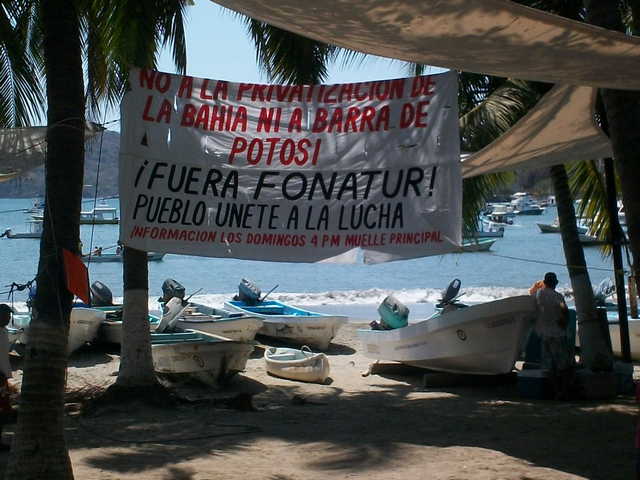 For five days in August 2011 locals took part in a sitting protest, but it was thwarted by the ex-secretary for judicial matters, Víctor Aguirre Alcaide. Although he had previously promised to request a reversal of the concession, he shut down the protest and threatened dissidents with arrest orders.
For five days in August 2011 locals took part in a sitting protest, but it was thwarted by the ex-secretary for judicial matters, Víctor Aguirre Alcaide. Although he had previously promised to request a reversal of the concession, he shut down the protest and threatened dissidents with arrest orders.
Fonatur responded with threats, boycotts, flyer drops, violence and media intimidation. People who for over five generations have earned a living from fishing and the dwindling tourist industry are now living with the constant threat of having their access to the harbour restricted and being displaced from their native land.
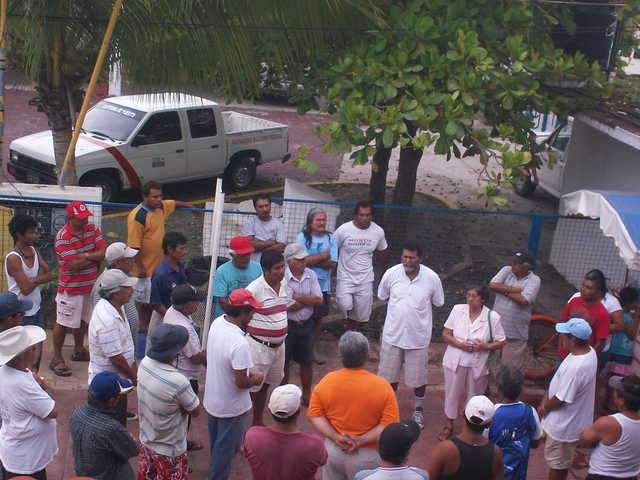 There is no sign of the reversal of the concession promised by governor Ángel Aguirre Rivero, nor any sign of action on the part of president Enrique Peña Nieto.
There is no sign of the reversal of the concession promised by governor Ángel Aguirre Rivero, nor any sign of action on the part of president Enrique Peña Nieto.
Nostalgia
Cándido has dedicated his whole life to riverside fishing: the ex-sailor has travelled the world, but has chosen to raise his family in the port. “Look, I’m defending the place because it is ours, I have travelled but I will always live in Zihuatanejo, we can’t allow it to be left with them”.
Gregorio Calixto, member of the cooperative Atarrayeros, goes further “they throw us out of the place where we live, old and illiterate, because the fisherman is the only illiterate worker, never studies, but if in any situation we have to go, we will first defend our livelihoods”. The majority of fishermen say that fishing “is the only job that doesn’t require papers”.
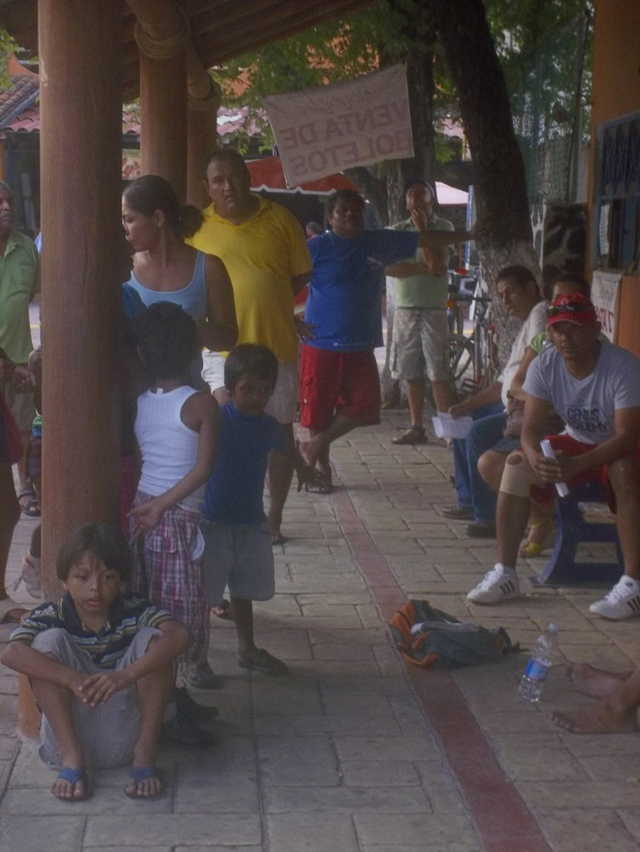 The president of Rogaz, Obdulia Balderas Sánchez says that political interests motivate the concession of the port of Zihuatanejo. For her, the National Tourism Fund (Fondo Nacional de Turismo/Fonatur) “is a murderous entity: it’s killing local towns, it’s port selling made official; it’s privatisation”.
The president of Rogaz, Obdulia Balderas Sánchez says that political interests motivate the concession of the port of Zihuatanejo. For her, the National Tourism Fund (Fondo Nacional de Turismo/Fonatur) “is a murderous entity: it’s killing local towns, it’s port selling made official; it’s privatisation”.
In spite of a multitude of support, forums, meetings in parliament, press releases, internet videos and protests about the situation, the reversal has still not been granted.
“If there’s no reversal, there’s no negotiation, we only want a reversal”, says Benjamín Lorenzano Basurto, president of the Los Pulpos cooperative and fisherman for over 20 years.
Meanwhile, 27 fishing cooperatives and over 11,000 locals live in constant fear of being cut off from their only livelihood: the sea.
(Translated by Claudia Rennie)

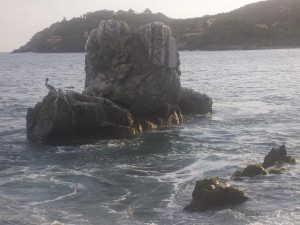


No hay comentarios.:
Publicar un comentario